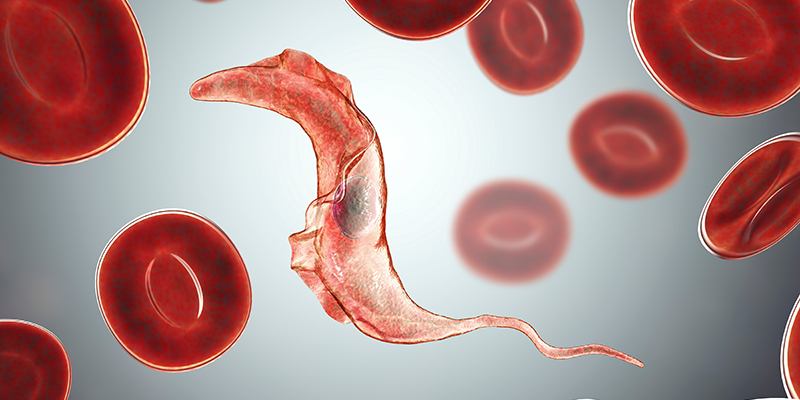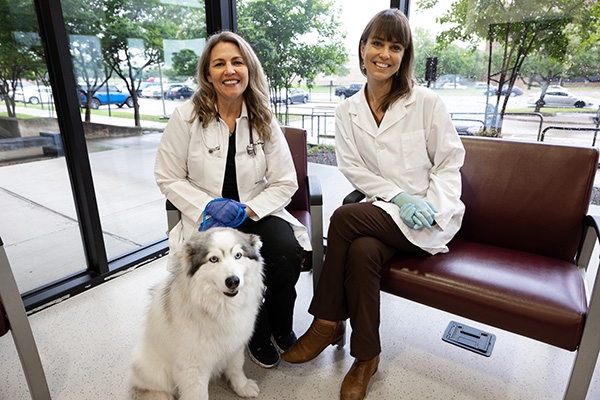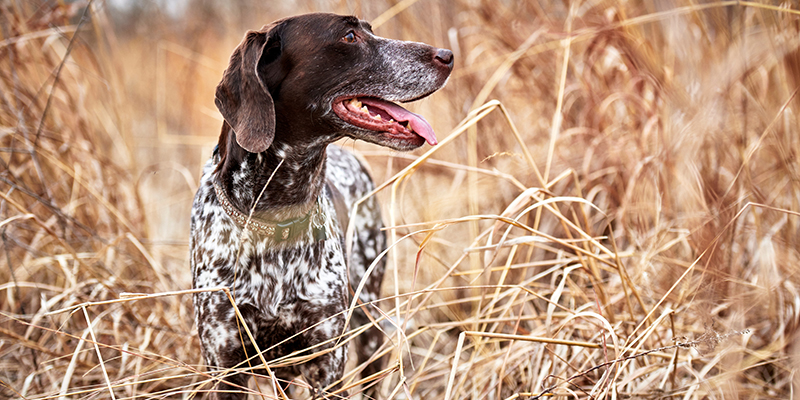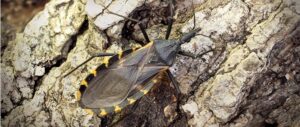Learn more about Canine Chagas Collaborative programs and funding.
Current Grants
Canine Chagas Disease Prevalence, Prevention, & Operational Capability Protection
Researchers: Sarah Hamer, Ashley Saunders, Rick Tarleton (UGA), and Heather Manley Lillibridge (CBTS at Texas A&M)
Funding: Department of Homeland Security (DHS) through Cross-border Threat Screening and Supply Chain Defense (CBTS) at Texas A&M
Timeframe: 09/30/2024–09/29/2026
Funded by the United States Department of Homeland Security (DHS), we will monitor DHS-owned working dogs that are often trained in areas where Chagas disease is prevalent to understand how they are exposed to the disease, as well as the impacts it can have on heart health.
Government working dogs are commonly trained in Texas to detect things such as explosives or drugs, but they may perform their jobs for customs, border patrol, and transportation systems anywhere in the U.S. As such, dogs could acquire an infection in the South — where kissing bugs occur — and later be transported to other regions of the country where the disease hasn’t traditionally occurred and where there is little veterinary awareness.
News about this project:


Treatment outcome requirements for disease prevention in Chagas disease (1R01AI180075-01)
- Researchers: Rick Tarleton (UGA), Sarah Hamer, and Ashley Saunders
- Funding: National Institutes of Health (NIH) National Institute of Allergy and Infectious Diseases (NIAID)
- Timeframe: 08/19/2024–06/30/2028
AKC CHF: ‘100 dog study’
Researchers: Sarah Hamer, Ashley Saunders, and Rick Tarleton (University of Georgia [UGA])
Funding: American Kennel Club Canine Health Foundation (AKC CHF)
Timeframe: 02/01/2025–01/31/2027
Over the last eight years, we have characterized the wide clinical spectrum of disease progression in Trypanosoma cruzi-infected dogs, which was a critical prerequisite for our recent collaborative studies that showed parasitological cure after the use of a modified benznidazole (BNZ) treatment regimen. We now aim to develop a disease staging system and provide this promising treatment across 100 dogs to learn which dogs will benefit the most from treatment. Combined with regular screening, the ability to quickly treat infected dogs with a safe, easy treatment would provide a tool for veterinarians to alleviate the disease burden and improve canine health, with translational impacts in human medicine.
NO DOGS ARE CURRENTLY BEING ENROLLED IN THIS STUDY!

- Objective 1. Integrate clinical, molecular, and serologic data to refine a canine Chagas disease staging system.
- Objective 2. Treat 100 T. cruzi-infected dogs in different states of disease with a modified benznidazole regimen and monitor changes in parasitological and clinical status.

Canine Chagas disease and the fecal microbiota: Longitudinal assessments and associations with clinical disease outcomes
- Researchers: Ilana Mosely (PhD student) and Sarah Hamer
- Funding: National Center for Veterinary Parasitology (NCVP)
- Timeframe: 01/2025–12/2025
Screening for Leishmania in dogs at risk for Trypanosoma cruzi infection to investigate increasing parasitic disease rates in Texas
- Researchers: Ashley Saunders, Sarah Hamer, and Dawn Wetzel (The University of Texas Southwestern Medical Center)
- Funding: The University of Texas Southwestern / Texas A&M University Pilot Award – NIH Clinical Translational Science Award (CTSA)
- Learn more about the collaboration between the VMBS & UT Southwestern…

Past Grant Support
- AKC CHF
- Canine Systemic Insecticides as a Novel Intervention to Protect Dogs from Triatomine Insect Vectors of Chagas Disease
- Canine Chagas Disease: Characterizing Cardiac Disease and Developing Screening Recommendations for Asymptomatic Dogs Seropositive for Trypanosoma cruzi
- Canine Chagas Disease: Characterizing Cardiac Abnormalities, Vector Infection and Control Strategies, and Parasite Strains in Kennel Environments
- American Veterinary Medical Foundation/Veterinary Pharmacology Research Foundation
- Bernice Barbour Foundation
Donors
- Harry Willett Foundation
- H-E-B
- Alamo Brittany Club
- Texas Coastal Brittany Club
- DAKOTA Fund
- George Robinson Foundation
Help Us!

Have you found a kissing bug?
Submit it to the Kissing Bug Community Science Program!
This program has received nearly 10,000 kissing bugs from the public since 2013 from across 28 states, with photo submissions spanning 10 countries! We welcome your submissions to advance the science.
